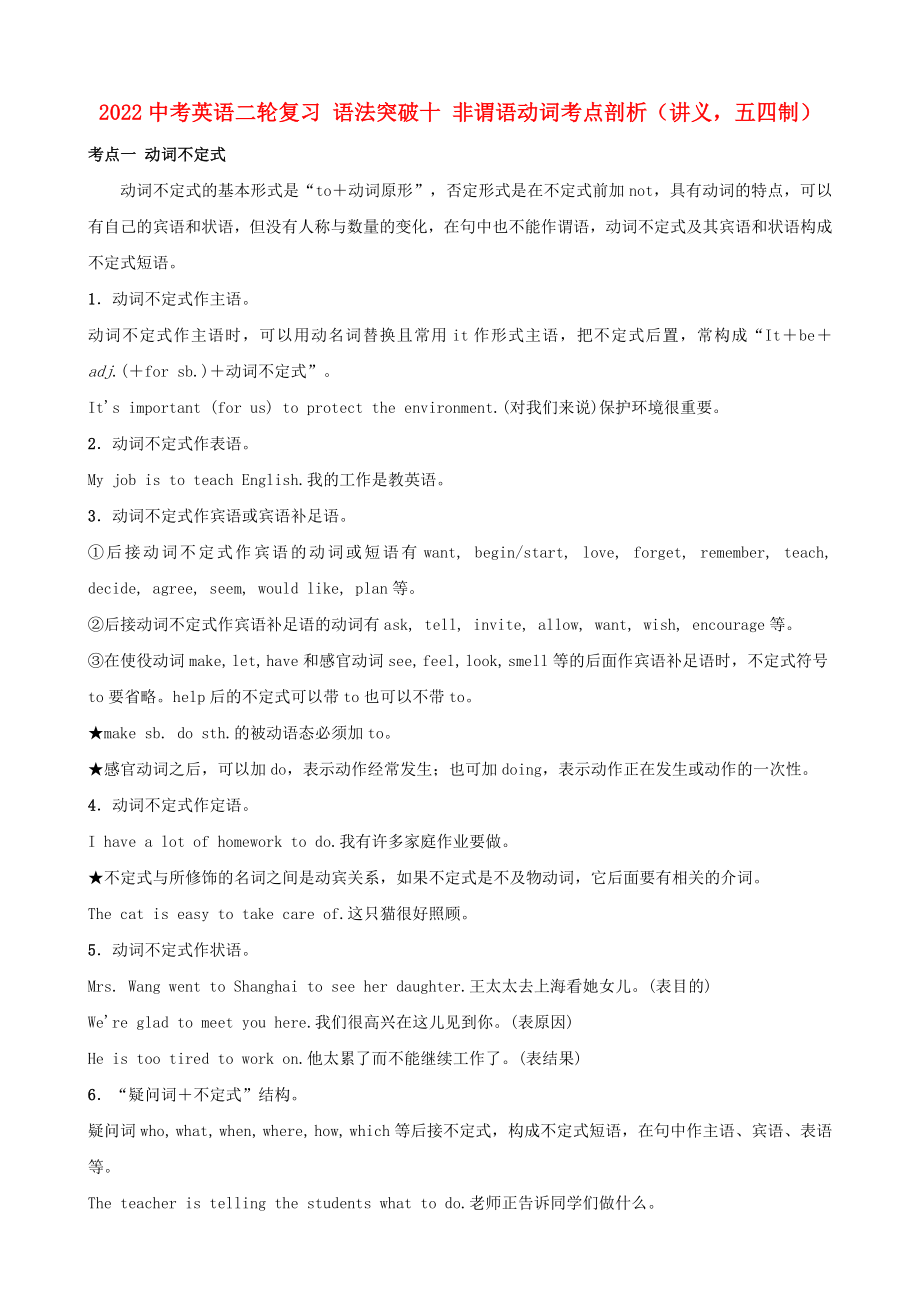《2022中考英語(yǔ)二輪復(fù)習(xí) 語(yǔ)法突破十 非謂語(yǔ)動(dòng)詞考點(diǎn)剖析(講義五四制)》由會(huì)員分享���,可在線閱讀��,更多相關(guān)《2022中考英語(yǔ)二輪復(fù)習(xí) 語(yǔ)法突破十 非謂語(yǔ)動(dòng)詞考點(diǎn)剖析(講義五四制)(4頁(yè)珍藏版)》請(qǐng)?jiān)谘b配圖網(wǎng)上搜索����。
1����、2022中考英語(yǔ)二輪復(fù)習(xí) 語(yǔ)法突破十 非謂語(yǔ)動(dòng)詞考點(diǎn)剖析(講義���,五四制)
考點(diǎn)一 動(dòng)詞不定式
動(dòng)詞不定式的基本形式是“to+動(dòng)詞原形”��,否定形式是在不定式前加not�,具有動(dòng)詞的特點(diǎn),可以有自己的賓語(yǔ)和狀語(yǔ)���,但沒(méi)有人稱與數(shù)量的變化�����,在句中也不能作謂語(yǔ)���,動(dòng)詞不定式及其賓語(yǔ)和狀語(yǔ)構(gòu)成不定式短語(yǔ)。
1.動(dòng)詞不定式作主語(yǔ)�。
動(dòng)詞不定式作主語(yǔ)時(shí),可以用動(dòng)名詞替換且常用it作形式主語(yǔ)����,把不定式后置,常構(gòu)成“It+be+adj.(+for sb.)+動(dòng)詞不定式”�����。
It's important (for us) to protect the environment.(對(duì)我們來(lái)說(shuō))保護(hù)環(huán)境很重要��。
2、2.動(dòng)詞不定式作表語(yǔ)���。
My job is to teach English.我的工作是教英語(yǔ)�。
3.動(dòng)詞不定式作賓語(yǔ)或賓語(yǔ)補(bǔ)足語(yǔ)�����。
①后接動(dòng)詞不定式作賓語(yǔ)的動(dòng)詞或短語(yǔ)有want, begin/start, love, forget, remember, teach, decide, agree, seem, would like, plan等��。
②后接動(dòng)詞不定式作賓語(yǔ)補(bǔ)足語(yǔ)的動(dòng)詞有ask, tell, invite, allow, want, wish, encourage等��。
③在使役動(dòng)詞make, let, have和感官動(dòng)詞see, feel, look, smell等的后面
3����、作賓語(yǔ)補(bǔ)足語(yǔ)時(shí),不定式符號(hào)to要省略����。help后的不定式可以帶to也可以不帶to。
★make sb. do sth.的被動(dòng)語(yǔ)態(tài)必須加to���。
★感官動(dòng)詞之后,可以加do���,表示動(dòng)作經(jīng)常發(fā)生����;也可加doing,表示動(dòng)作正在發(fā)生或動(dòng)作的一次性�。
4.動(dòng)詞不定式作定語(yǔ)。
I have a lot of homework to do.我有許多家庭作業(yè)要做�����。
★不定式與所修飾的名詞之間是動(dòng)賓關(guān)系���,如果不定式是不及物動(dòng)詞����,它后面要有相關(guān)的介詞����。
The cat is easy to take care of.這只貓很好照顧。
5.動(dòng)詞不定式作狀語(yǔ)�����。
Mrs. Wang went to Sha
4�����、nghai to see her daughter.王太太去上海看她女兒���。(表目的)
We're glad to meet you here.我們很高興在這兒見(jiàn)到你�。(表原因)
He is too tired to work on.他太累了而不能繼續(xù)工作了��。(表結(jié)果)
6.“疑問(wèn)詞+不定式”結(jié)構(gòu)���。
疑問(wèn)詞who, what, when, where, how, which等后接不定式���,構(gòu)成不定式短語(yǔ),在句中作主語(yǔ)�����、賓語(yǔ)���、表語(yǔ)等����。
The teacher is telling the students what to do.老師正告訴同學(xué)們做什么��。
He didn't know wh
5��、ere to go/where he should go.他不知道去哪里��。
7.動(dòng)詞不定式的特殊句型�。
單項(xiàng)選擇
1.(xx·上海中考)Mr. Zhou is good at cooking and he has decided his own restaurant.
A.open B.opened C.to open D.opening
2.(xx·四川成都中考改編)I got up early this morning my grandma at the airport.
A.to pick up B.picking up
6、 C.picked up D.pick up
3.(xx·四川樂(lè)山中考改編)—Julia, your mobile phone is ringing.
—Wait a minute. It's dangerous it while crossing the street.
A.a(chǎn)nswering B.a(chǎn)nswer C.to answer D.a(chǎn)nswered
考點(diǎn)二 動(dòng)名詞
動(dòng)名詞由“動(dòng)詞原形+-ing”構(gòu)成�,與現(xiàn)在分詞同形。動(dòng)名詞既有動(dòng)詞的性質(zhì)(可有賓語(yǔ)和狀語(yǔ))����,也有名詞的性質(zhì),可作主語(yǔ)�����、賓語(yǔ)���、表語(yǔ)或定語(yǔ)��。
1.動(dòng)名詞常用結(jié)構(gòu):
①doing結(jié)
7���、構(gòu)有keep doing, avoid doing, consider doing, enjoy doing, feel like doing, finish doing, mind doing, stop doing, practice doing, suggest doing, understand doing, be busy doing, be good at doing, be interested in doing, can't help doing, give up doing, make a living (by) doing, put off doing, there be
8、sb. doing sth.等��。
②have+n.+(in) doing結(jié)構(gòu)有have fun (in) doing, have trouble (in) doing, have a hard time (in) doing, have problems/difficulties (in) doing等。
③to doing 結(jié)構(gòu)有be/get used to doing, look forward to doing, pay attention to doing, prefer doing to doing等����。
2.有些動(dòng)詞既可接不定式也可接動(dòng)名詞,但表達(dá)的意義不同�。
stop
f
9、orget
remember
try
(一)單項(xiàng)選擇
1.(xx·湖北襄陽(yáng)中考)The traffic is terribly busy in the morning. You'd better avoid in the center of the city.
A.drive B.driving C.to drive D.driven
2.(xx·江蘇南京中考)Some people enjoy out their messages in bottles when they travel on the sea.
A.to send
10�����、B.send C.sending D.sent
(二)單詞拼寫(xiě)與運(yùn)用
(xx·江蘇鹽城中考)All of us should look straight ahead and
keep (run).
考點(diǎn)三 現(xiàn)在分詞
現(xiàn)在分詞由“動(dòng)詞原形+-ing”構(gòu)成�,表示主動(dòng)、進(jìn)行意義�����,具有形容詞的作用���,可在句中作表語(yǔ)�����、定語(yǔ)�����、賓語(yǔ)�、補(bǔ)足語(yǔ)、狀語(yǔ)等��。
The crying girl can't find her mother.那個(gè)正在哭的女孩找不到她媽媽了�����。(定語(yǔ))
The story is interesting.這個(gè)故事很有趣�����。(表語(yǔ))
I saw hi
11��、m studying in the classroom.我看到他正在教室里學(xué)習(xí)�。(賓語(yǔ)補(bǔ)足語(yǔ))
Studying hard, you will pass the exam.只要你努力學(xué)習(xí)����,就會(huì)通過(guò)考試。(狀語(yǔ))
考點(diǎn)四 過(guò)去分詞
由“動(dòng)詞原形+-ed”構(gòu)成�����,表示被動(dòng)、完成意義�����,在句中作表語(yǔ)��、定語(yǔ)�����、賓語(yǔ)補(bǔ)足語(yǔ)��、狀語(yǔ)等��。
She is very tired.她很疲勞��。(表語(yǔ))
The boy wore a pair of faded jeans.那個(gè)男孩穿了一條褪色的牛仔褲��。(定語(yǔ))
She found the village greatly changed.她發(fā)現(xiàn)這個(gè)村莊變化很大�。(賓語(yǔ)補(bǔ)足語(yǔ))
單詞拼寫(xiě)與運(yùn)用
(xx·江蘇宿遷中考)Our earth is being more and more (pollute) because of the rapid increase in population.
參考答案
考點(diǎn)一
1~3 CAC
考點(diǎn)二
(一)1~2 BC
(二)running
考點(diǎn)四
polluted
 2022中考英語(yǔ)二輪復(fù)習(xí) 語(yǔ)法突破十 非謂語(yǔ)動(dòng)詞考點(diǎn)剖析(講義五四制)
2022中考英語(yǔ)二輪復(fù)習(xí) 語(yǔ)法突破十 非謂語(yǔ)動(dòng)詞考點(diǎn)剖析(講義五四制)

